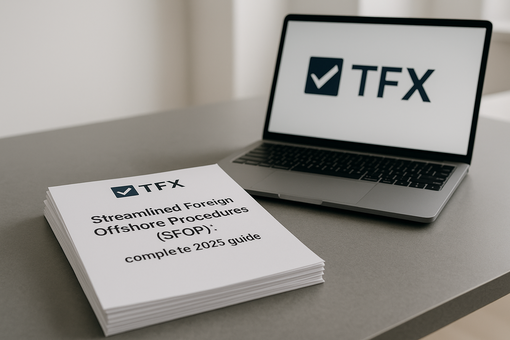Simple Tax Guide for Americans in Cameroon

US Expat Taxes - Cameroon
At Taxes for Expats we have been preparing U.S. tax returns for U.S. Citizens and green card holders working in Cameroon for over 8 years. Our clients hail from all parts of the country - Douala and Yaoundé, Garoua and Maroua, Bafoussam and Bamenda.
As a U.S. Citizen or green card holder you are legally required to file a U.S. tax return each year regardless of whether you already pay taxes in your residence country.
We offer professional tax services. That means we figure out the best and most optimal way to file your U.S. tax return and avail you of all possible exclusions and deductions. But just as importantly - avoid the errors that would allow IRS to disallow your return and levy fines & penalties on top. You can also do them yourself - not that we recommend it. For more information please see IRS.
The expatriate Foreign Earned Income Exclusion can only be claimed if you file your tax return on a timely basis. It is not automatic if you fail to file and can even be lost.
We have many clients living in Egypt and know how to integrate your U.S. taxes into the local income taxes you pay. Any Egyptian income tax you already pay can be claimed as against the tax liability on your U.S. return on the same income.
As an expat living abroad you get an automatic extension to file until June 15th following the calendar year end. (You cannot file using the calendar year as is standard in Egypt for U.S. tax purposes). You must, however, pay any tax that may be due by April 15th in order to avoid penalties and interest. You can get an extension to file (if you request it) until October 15th.
There are other forms which must be filed if you have foreign bank or financial accounts; foreign investment company; or own 10% or more of a foreign corporation or foreign partnership. If you do not file these form or file them late, the IRS can impose penalties of $10,000 or more per form. These penalties are due regardless of whether you owe income taxes or not.
We have helped hundreds of expats around the world catch up with their past U.S. taxes because they have failed to file U.S. tax returns for many years. This is, in fact, our specialty and we offer a 10% discount to clients to wish to file multiple tax returns at once and get in full compliance with the IRS.
Work with a recognized expert to help you prepare your American tax return. We can also provide tax planning and advice with other expatriate tax; we look forward to working with you.
Below we include information on the Cameroonian Tax System for the American Expatriates.
Cameroon personal income tax rates are progressive, between 11% - 38.5%.
| Taxable Income ax Rate % | |
| 0 to 2,000,000 | 11% |
| 2,000,001 to 3,000,000 | 16.5% |
| 3,000,001 to 5,000,000 | 27.5% |
| more than 5,000,000 | 38.5% |
The net incomes from other activities are subject to income tax at 33%.
Basis – Individuals resident in Cameroon are taxable on their worldwide income; nonresidents are taxable only on their Cameroon-source income.
Residence – An individual is resident in Cameroon if his/her principal centre of interest or business is in Cameroon or place of abode is in Cameroon (i.e. more than 183 days in a tax year are spent in Cameroon).
Filing status – Taxpayers who derive income only from employment and whose taxes are withheld at source by the employer need not file a tax return. For couples married under the joint property regime, any earnings from real estate may be declared by either spouse.
Taxable income – A single income tax, based on graduated rates, applies to the net total income derived from various categories of income. Income categories include: salaries, wages, pensions and life annuities, income from stocks and shares, income from real estate, profits from handicraft, industrial and commercial activities, profits from agricultural activities and profits from non-commercial and related professions.
Capital gains – Capital gains derived from the sale of shares are subject to tax at a final rate of 11%. Unrealised gains arising from company mergers are not subject to personal income tax if the new company has its registered office in Cameroon or another CEMAC state.
Deductions and allowances – Allowable deductions include business expenses, social security contributions, professional expenses (fixed at 30%) and a real estate deduction (fixed at 30%).
Rates – Progressive rates are imposed from 11% to 38.5%.
Other taxes on individuals:
Capital duty – Under the Finance Law for fiscal year 2010, the formation of a company and subsequent capital increases are not subject to registration fees.
Stamp duty – Various stamp duties apply to contractual obligations and transfers or leases of property at rates ranging from 1% to 15%. Fixed stamp duties are levied on motor vehicle licences, advertising materials, passports, visas and bills of lading.
Capital acquisitions tax – No
Real property tax – Property tax is payable annually on real estate for which an ownership certificate or an administrative or judicial order has been issued. Tax is charged at 0.1% of the assessed property value, with the usual 10% local surcharge.
Inheritance/estate tax – Tax is charged at progressive rates up to 10% on estates valued in excess of XAF 10 million. The first XAF 500,000 is tax free.
Net wealth/net worth tax – No
Social security – Employees are required to make monthly contributions to the National Social Insurance Fund. Employees contribute 2.8% of basic pay and allowances, up to XAF 300,000 per month. For the Housing Loan and Employment Fund, employees contribute 1% of their gross salaries.
Administration and compliance:
Tax year – Calendar year
Filing and payment – The employer deducts tax on employment income and remits it to the tax authorities before the 15th of each month. However, employers do not deduct personal income tax when the employee earns less than XAF 62,000 per month. Tax on income from an individual's business also is due at the same time. The annual tax return and any balance of tax must be submitted by 15 March of each year.
Penalties – Interest may be imposed at 1.5% of the tax due per month for late filing or payment. Regarding the monthly payments of taxes, late declarations are subject to a penalty of 10% per month, which shall not exceed 30%, as provided under the Finance Law for fiscal year 2010. Penalties are assessed at: 30% (good faith), 100% (bad faith) and 150% (fraud). Where a taxpayer initiates the process to settle outstanding taxes, no penalties will be assessed.
Cameroon Corporate Tax Rates
Cameroon corporate tax rate is 38.5%. That is: corporate tax rate of 35% + 10% surcharge.
The basic corporate tax rate of 35% is reduced to 30% for companies during their first 3 years of listing on the national stock exchange of Cameroon.
Residence – An entity is deemed resident if its registered office, centre of activity or management is located in Cameroon or if it has resident employees in Cameroon that provide services to customers.
Basis – Resident corporations are taxed on their worldwide income. Nonresidents are taxed only on Cameroon-source income.
Taxable income – Taxable profits are determined after deducting allowable expenses and charges.
Principal business entities - These are the public limited company, private limited company, partnership, economic interest group and branch of a foreign company.
Taxation of dividends – Dividends received by a resident company from a resident or nonresident company are subject to corporate income tax. The recipient may offset any Cameroon tax withheld from the dividends against its corporate income tax liability. Foreign tax paid on dividends derived from a nonresident company is not creditable against Cameroon corporate income tax unless specifically provided for under a tax treaty.
The treatment of dividends received by corporate shareholders differs when: (1) the shareholder owns at least 25% of the shares in the affiliate; (2) the head office of the shareholder and its affiliate are located in Cameroon or another CEMAC state; and (3) the shares remain registered in the name of the shareholder for at least 2 consecutive years. Shareholders satisfying these requirements are entitled to be taxed on 10% of the net dividends received. Where the payer and recipient disclose the dividends in their respective financial statements in the same year, the withholding tax paid by the affiliate may be set off against the withholding tax payable by the shareholder on any dividend distributions subsequently made by such shareholder.
Capital gains – Capital gains are treated as ordinary business income and taxed at normal company tax rates. Capital gains realised on the disposal of a fixed asset in the course of trading may be excluded from income for a period of 3 years if the taxpayer reinvests the gains in new fixed assets for the business. Capital gains arising from the gratuitous allocation of shares, founders' shares or debentures on the merger of limited liability companies or limited partnerships with share capital also are excluded, provided the company resulting from the merger has its registered office in Cameroon or another CEMAC state. Upon the assignment, transfer or cessation of a company within 5 years following its creation or purchase, net capital gains will be assessed at half their value (one-third of their value after more than 5 years).
Losses – Losses may be carried forward for up to 4 years but may not be carried back.
Tax Rate – The corporate tax rate is 35%. Taking into account the 10% surcharge, the effective rate is 38.5%. The basic rate is reduced to 30% for companies during their first 3 years of listing on the national stock exchange.
Surtax – A surcharge of 10% of the tax charged is levied over the 35% corporate tax rate.
Alternative minimum tax – A minimum tax is payable annually at 1% of the turnover of the company. A local surcharge of 10% also is payable, bringing the effective rate to 1.1% of turnover. The alternative minimum tax is applicable where a company posts a tax loss or where 1.1% of turnover amounts to more than 38.5% of taxable profits.
Foreign tax credit – No
Participation exemption – See under "Taxation of dividends".
Holding company regime – No
Tax Incentives – Under a reinvestment regime, eligible companies may benefit from a tax reduction of 50% of qualifying reinvestment, provided the reinvestment does not exceed 50% of the profits declared during the relevant fiscal year. Enterprises in the information and communication technologies sector are subject to a reduction of 25% of qualifying reinvestment, provided the reduction does not exceed 25% of profits declared during the relevant fiscal year.
Enterprises that create jobs in the agriculture, energy, tourism and social housing industries through a structuring project regime may be eligible for tax benefits, including: exemption from the business license tax for the first 2 years of operation; certain fixed (at XAF 50,000) rather than ad valorem registration fees; a VAT exemption on local purchases of building materials and imports related to the establishment of the project; an accelerated depreciation rate of 1.25 the normal rate for specific fixed assets required during the installation phase; and an extension of the loss carryforward period to 5 years.
Withholding tax:
Dividends – A withholding tax of 16.5% (15% withholding and a 10% local surcharge) applies to dividends paid to residents and nonresidents. The rate may be reduced under an applicable tax treaty.
Interest – A withholding tax of 16.5% (15% withholding and a 10% local surcharge) applies to interest paid to nonresidents. The rate may be reduced under an applicable tax treaty.
Royalties – Royalties paid to nonresidents are subject to a 15% withholding tax (the 10% local surcharge is not applicable). The rate may be reduced under an applicable tax treaty. However when such amounts are paid to a firm located outside the CEMAC that participates in the management of a Cameroon firm in which it holds shares, the royalties will be considered as sums accruing from the distribution of profits and taxable to withholding tax at the rate of 16.5%.
Branch remittance tax – No
Other taxes on corporations:
Capital duty – Under the Finance Law for fiscal year 2010, the formation of a company and subsequent capital increases are not subject to registration fees.
Payroll tax – Employers are required to make monthly contributions of 2.5% of the total amount of salaries and fringe benefits of their employees to the Housing Loan and Employment Fund.
Real property tax – Property tax is payable annually on real estate for which an ownership certificate or an administrative or judicial order has been issued. Tax is charged at 0.1% of the assessed property value, with the usual 10% local surcharge.
Social security – Employers pay 11.2% of employees' basic pay, allowances, and benefits monthly to the National Social Insurance Fund. These contributions are capped at XAF 300,000 per month.
Employers also must contribute 1.75%, 2.5% or 5% of total salaries, depending on the risk category of activities performed by employees.
Stamp duty – Various stamp duties apply to contractual obligations and transfers or leases of property at rates ranging from 1% to 15%. Fixed stamp duties are levied on motor vehicle licences, advertising materials, passports, visas and bills of lading.
Transfer tax – The sale of a business is subject to a transfer tax rate of 15%. For real property, see under "Stamp duty".
Other – A special income tax at the rate of 15% is withheld on payments made to suppliers of services located abroad.
Taxes are imposed on the sale of petroleum products, liquor and business licenses. The business license tax is imposed at graduated rates on the enterprise's annual turnover.
Anti-avoidance rules:
Transfer pricing – The tax authorities may make adjustments to taxable income where related party transactions are not conducted at arm's length.
Thin capitalisation – No
Controlled foreign companies – No
Other – No
Disclosure requirements – No
Administration and compliance:
Tax year – Tax year in Cameroon is the calendar year
Consolidated returns – No
Filing requirements – Advance payments of company taxes are due before the 15th of each month. Any final balance of tax is payable on submission of the annual tax return by 15 March of each year.
Penalties – Interest may be imposed at 10% of the tax due per month for late filing or payment. Regarding the monthly payments of taxes, late declarations are subject to a penalty of 10% per month, which shall not exceed 30%, as provided under the Finance Law for fiscal year 2010. Penalties are assessed at: 30% (good faith), 100% (bad faith) and 150% (fraud). Where a taxpayer initiates the process to settle outstanding taxes, no penalties will be assessed.
Foreign exchange control: All transfers of funds outside the Central African Economic and Monetary Community (CEMAC, consisting of Cameroon, Central African Republic, Chad, Republic of Congo, Equatorial Guinea and Gabon), including loans obtained by resident companies from abroad and the solicitation of foreign securities in the CEMAC zone, must be declared and are subject to special control measures for statistical purposes. Transfers of amounts in excess of XAF 5 million must be lodged with an authorised intermediary (i.e. a bank authorised by the central bank).
Documentation must be submitted to the authorities for currency transfers for the settlement of imports in excess of XAF 100 million.
Expatriate employees may apply for authorisation to repatriate part of their earnings on a regular basis. Employees may repatriate 20% of their net salary. However, if the family and dependents live outside the CEMAC zone, permission may be obtained to repatriate up to 50% of net earnings. Any savings accumulated by expatriates may be repatriated upon departure from Cameroon. All foreign direct investment exceeding XAF 100 million is subject to prior notification to the Ministry of Finance.
Cameroon VAT (Value Added Tax) Rate
Standard Value Added Tax (la Taxe sur la Valeur Ajoutée - TVA) rate in Cameroon is 19.25%.
Exports are zero VAT rated. An excise duty to the rate of 25% is applicable to the cigarettes, drinks, cosmetics or products known as of luxury: jewels, precious stones.
Taxable transactions – VAT is levied on the supply of goods; the provision of services; the import of goods; real estate activities; construction and delivery of buildings by real estate professionals; the sale of second-hand goods and equipment by professionals; transfers of non-exempt assets; and the leasing of underdeveloped land and unfurnished premises by real estate professionals.
Rates – The effective standard VAT rate is 19.25% (i.e. a 17.25% VAT and 10% surcharge). Exports are zero rated. Certain essential goods are exempt.
Registration – All corporate businesses with taxable turnover are required to register.
Individuals must register if their taxable turnover is over XAF 15 million. Nonresident VAT payers are required to appoint a solvent resident representative to be jointly responsible for the payment of VAT and the discharge of other VAT obligations.
Filing and payment – VAT returns, and any tax payable, are due by the 15th of each month. Late payment incurs interest penalties at a rate of 1.5% per month, up to a maximum of 50% of the principal liability.
Fines are levied for various omissions in discharging VAT obligations.
Source of tax law: The Universal declaration of human rights, the Constitution of Cameroon, international treaties, the tax conventions for the avoidance of double taxation, the laws and regulations relating to tax - notably the General Tax Code.



